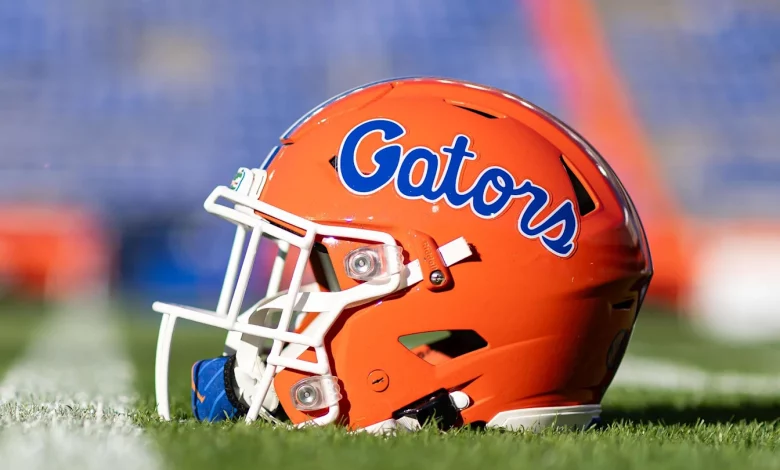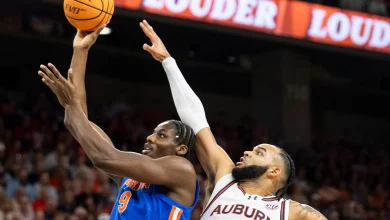The Florida Gators have been in search of a spark to reignite their football program—and they may have just found it with the commitment of four-star offensive lineman Will Griffin. The standout recruit chose Florida over national powerhouses like Alabama and Tennessee, giving a major lift to the Gators’ 2026 recruiting class

The moment Will Griffin stepped behind the podium, surrounded by family members and coaches inside his Tampa Catholic High School gym, the tension was electric. Draped in a navy suit with orange-and-blue socks peeking out beneath his slacks, the 6-foot-5, 315-pound offensive lineman paused just before making his decision. Then came the grin, the hat pull, and the words every Gators fan had been hoping for: “I’m staying home. I’m a Florida Gator.”
With that, Billy Napier and the Florida coaching staff landed one of the most important commitments of the 2026 cycle—both symbolically and strategically. Will Griffin, ranked as the No. 6 interior offensive lineman in the nation and a consensus top-100 player overall, chose Florida over elite contenders including Alabama, Tennessee, Florida State, and Georgia. His commitment sends a powerful message about where the Gators are headed and provides the type of trench foundation that championship programs are built upon.
For Napier and his staff, Griffin represents far more than just a high-profile addition to the recruiting board. He’s a tone-setter, the kind of player around whom you build both a line and a locker room. Physical, smart, and intensely competitive, Griffin has long been regarded as one of the most technically polished linemen in the country. He brings a unique blend of footwork, leverage control, and nastiness at the point of attack—qualities Florida desperately needs up front as it works to reestablish its identity as a physically dominant SEC contender.
Griffin’s path to Gainesville was anything but straightforward. Over the past year, he became one of the most sought-after offensive linemen in the class, earning over 30 Power Five offers and making multiple visits to campuses across the Southeast. Alabama had made a hard push early, with offensive line coach Eric Wolford developing a strong relationship with Griffin’s family. Tennessee had gained serious ground in the winter, thanks in part to Griffin’s bond with quarterback commit Drew Harrington, a fellow Floridian.
But Florida, quietly and consistently, never relented. Offensive line coach Rob Sale and assistant Darnell Stapleton were on Griffin early, evaluating him in person and staying in close communication throughout his rise. The coaching staff’s message was clear and consistent: “We want you to be a cornerstone. Not just a piece. A foundation.”
That pitch paid off during Griffin’s official visit to Gainesville in early June. According to sources close to the recruitment, it was during that trip that the tide truly turned. Griffin spent time with current players, walked through the newly renovated Heavener Football Training Center, and sat in on offensive line meetings led by Sale, who has coached multiple NFL starters and brings a direct, development-focused approach.
More than just facilities and football talk, what resonated with Griffin was Florida’s commitment to building a blue-collar, athlete-centered culture. He noted the team’s accountability model, its emphasis on leadership development, and its renewed focus on toughness in the trenches. He left Gainesville with a sense that Florida wasn’t just where he could play—it was where he could thrive.
“I could see myself being part of something real there,” Griffin said after the visit. “It wasn’t just about hype. It was about hard work and building something the right way.”
That mentality mirrors Griffin’s own football journey. Raised in a hardworking family in Hillsborough County, Griffin developed his craft early under the guidance of his father, a former JUCO lineman who instilled in him the importance of footwork, hand placement, and film study. By the time he entered high school, Griffin was already flashing advanced technique and mental toughness, quickly earning a spot on varsity as a freshman and anchoring the line for three straight seasons.
As a junior, Griffin dominated competition in Florida’s toughest classification, earning first-team All-State honors and averaging more than 12 knockdown blocks per game. His pass-blocking efficiency was elite—he allowed zero sacks over 11 games and routinely handled blitzing linebackers and edge rushers with poise. His athletic profile is equally impressive, with a 5.01 forty-yard dash, a 400-pound bench press, and a vertical leap that rivals some tight ends.
Recruiting analysts say Griffin is one of the most plug-and-play-ready linemen in the entire 2026 class. He projects as a multi-year starter at guard but has enough length and athleticism to slide out to right tackle if needed. His versatility is exactly what Florida needs, especially in a conference where depth along the offensive line often separates contenders from pretenders.
Landing Griffin also represents a strategic win for Florida in its own backyard. Tampa has long been a battleground for SEC programs, with schools like Alabama and Georgia frequently poaching top-tier talent. Keeping a national blue-chip prospect like Griffin in-state shows that the Gators are reasserting their grip on Florida’s most fertile recruiting grounds.
The ripple effect of Griffin’s commitment may extend beyond the line of scrimmage. He is well-respected among his peers and has strong relationships with several elite prospects still on the board, including five-star wide receiver Malcolm James, four-star tight end Landon Cruz, and elite defensive tackle Ahmad Berry. Florida hopes Griffin becomes not just a building block but also a recruiter in cleats.
“I want to help bring in a class that wins championships,” Griffin said. “Florida has the potential. Now it’s about getting the right dogs in the room.”
His commitment gives Florida its 12th pledge in the 2026 cycle and elevates the Gators into the top 10 in the national class rankings, according to ESPN and 247Sports. More importantly, it shores up a position of need. Florida has struggled with offensive line consistency in recent years, rotating combinations due to injuries and attrition. Griffin provides immediate depth and long-term stability.
Billy Napier praised Griffin’s decision, calling him “a future leader and a perfect fit for what we’re building in Gainesville.”
“Will is the kind of player every coach wants,” Napier said in a released statement. “He’s tough, smart, driven—and he plays with that edge we’re looking for. We’re fired up to have him in the orange and blue.”
Griffin will enroll early in January, allowing him to participate in spring practice and begin competing for a role in Florida’s 2026 offensive line rotation. Coaches believe he’ll have a shot to earn second-team reps as a freshman and potentially start by his sophomore year. The plan is to develop him slowly, letting him learn the nuances of Florida’s wide-zone scheme while maintaining his physical edge.
Griffin, for his part, isn’t afraid of the challenge. He knows SEC football is a grind—but it’s the kind of grind he’s prepared for.
“This is why I play the game,” he said. “To compete at the highest level, to test myself, to become the best version of who I can be. Florida is going to get everything I’ve got.”
That type of mindset is exactly what the Gators have been craving. With the program entering a critical stretch—both on the field and in perception—players like Will Griffin represent a turning point. They aren’t just picking Florida because of its history or helmets. They’re choosing Florida because of its future.
And if Griffin’s track record is any indication, that future may be a whole lot tougher—up front and in the win column.









